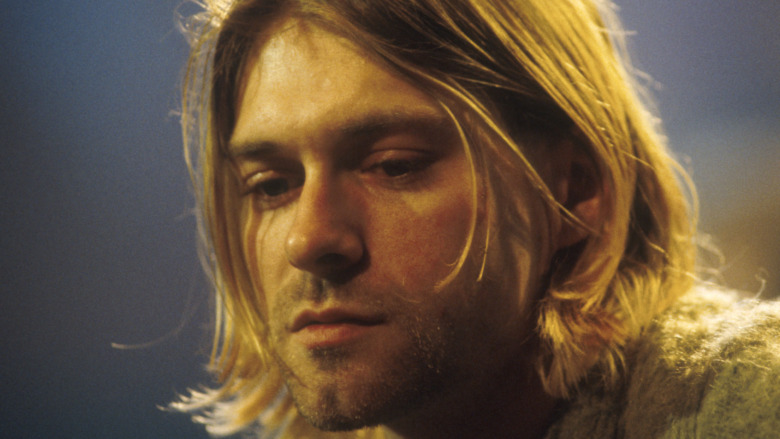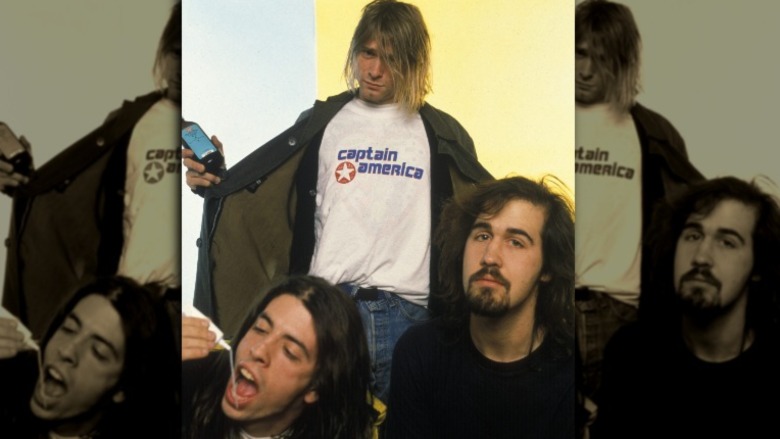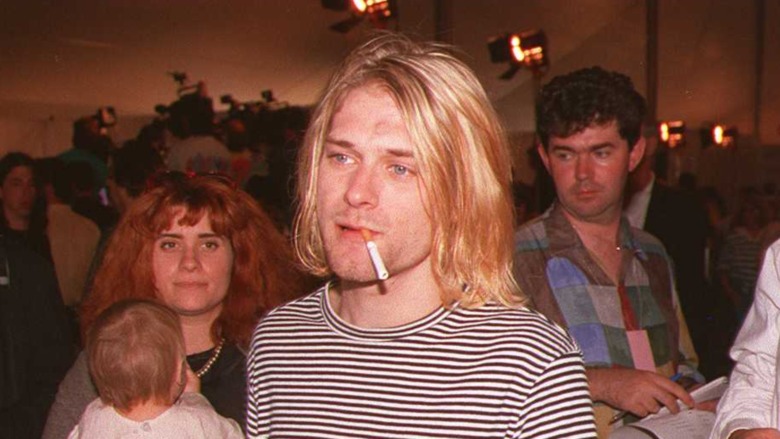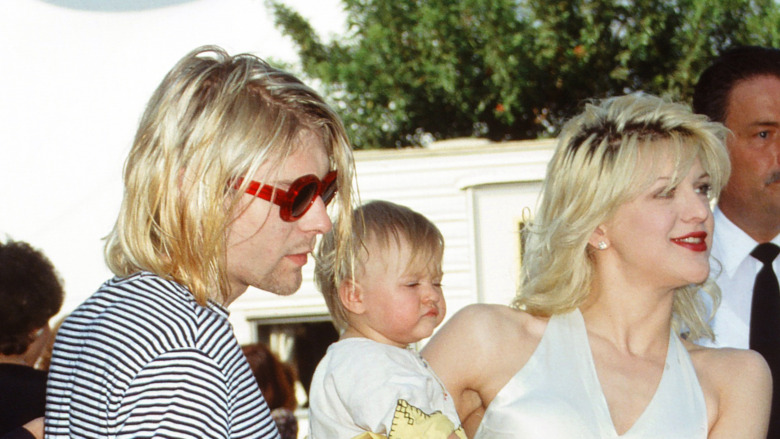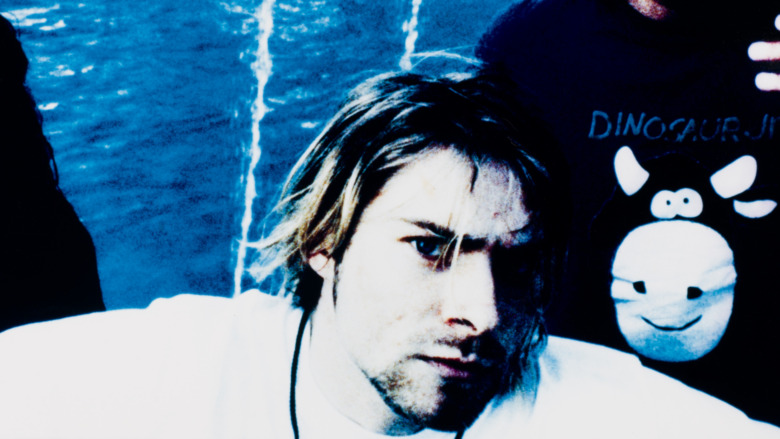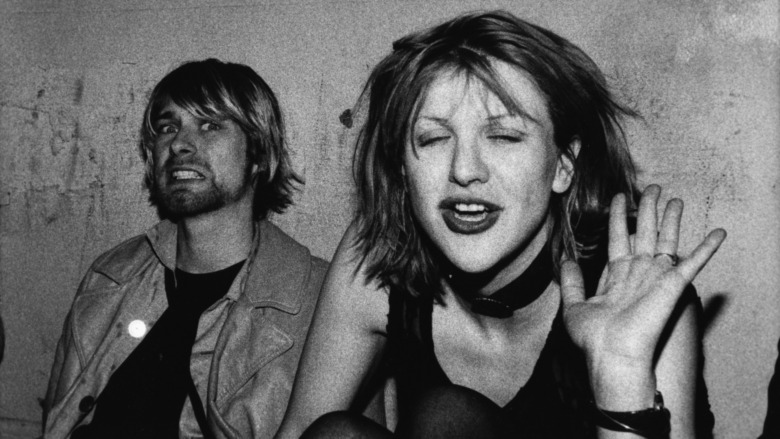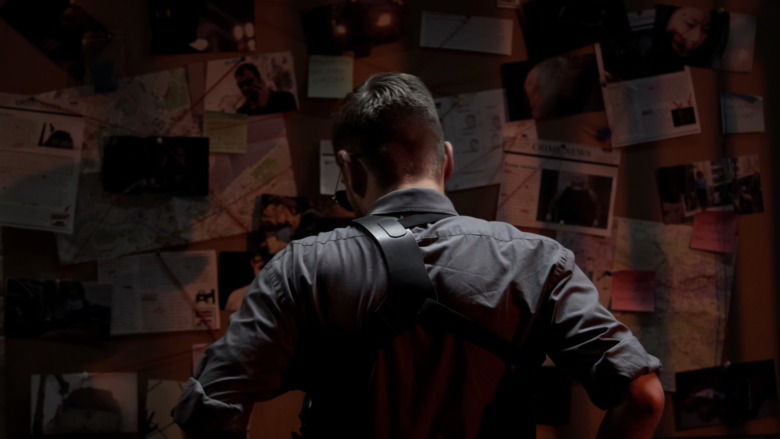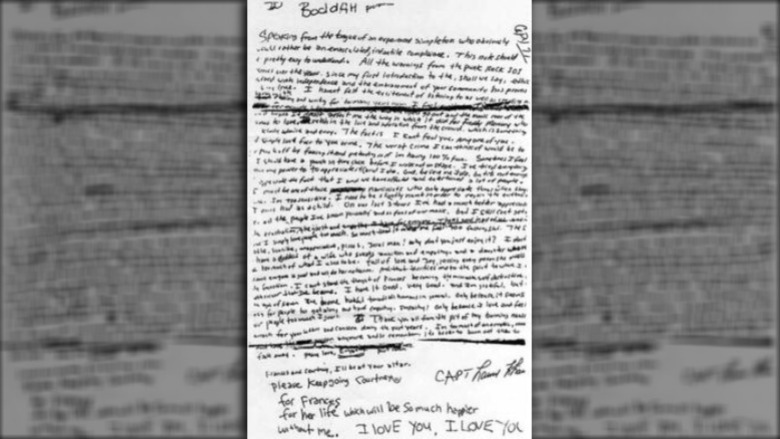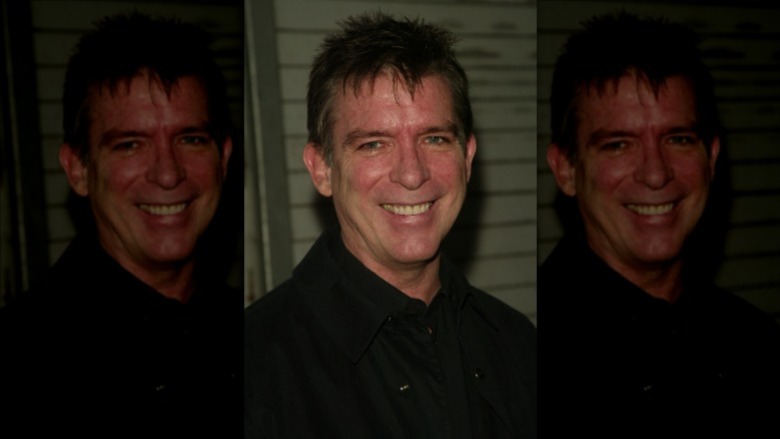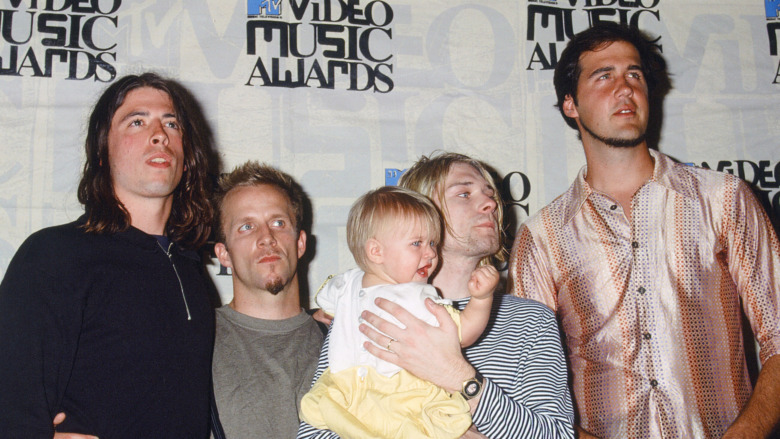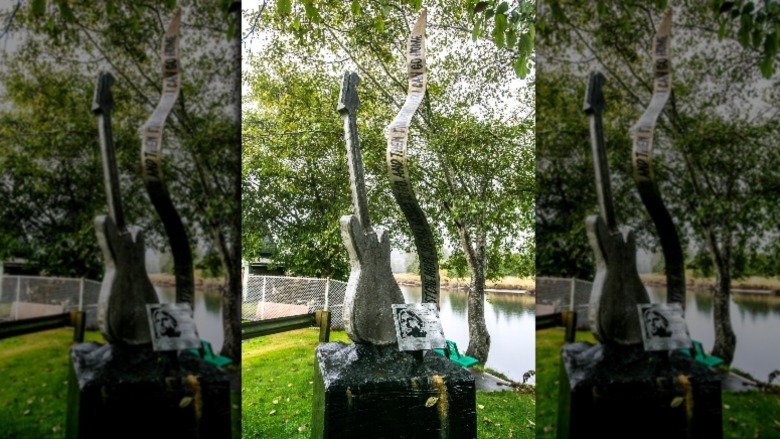What It Was Really Like The Day Kurt Cobain Died In 1994
Kurt Cobain has now been dead for about as long as he was alive. He was the voice of Generation X: snarling, defiant, defeated rage — yet catchy enough to get frequent radio play. Cobain grew up in the working-class Aberdeen, Washington, a child of divorce, feeling a few shades more disaffected than most teenagers. Though he was so talented a visual artist that he earned a college scholarship — and later designed Nirvana's covers — Cobain turned it down so that he could continue to hang around his birthplace, being a roadie for the Melvins and trying to make music, according to Rolling Stone. He fell into drugs hard, but he hit sparks at the right moment "trying to rip off the Pixies," forming the band Nirvana. Within a few years, they became the archetype for grunge music.
As far as anyone admits, no one knew on April 5, 1994, that Cobain had killed himself. The police could reconstruct later that he had snuck unnoticed into the greenhouse above the garage in the surprisingly modest home he owned in Seattle, Washington. It is not clear how long he was there before beginning the steps that would end in his death. Though people had been frantically looking for him and had searched his house, his body was not found for two and a half days, per Rolling Stone.
Kurt Cobain's suicide stripped away the man, leaving behind only the myth.
If you or anyone you know is having suicidal thoughts, please call the National Suicide Prevention Lifeline at 1-800-273-TALK (8255).
The final tour
A month before Kurt Cobain's suicide, Nirvana was on tour through Europe. Cobain's always coarse singing voice kept failing on him, resulting in a diagnosis of laryngitis and bronchitis. The doctor told him that he had better learn a new way to sing. Rather than continuing to cancel shows — having made it only five days into the tour, according to Consequence of Sound — Nirvana postponed the rest. His last performance was at Terminal Einz in Munich, Germany, on March 1.
Cobain left for Rome, where he met up with his wife Courtney Love, singer for the band Hole, and their baby daughter Frances Bean. Rosemary Carroll, Love and Cobain's lawyer, claimed that he had called her just before going onstage for his last performance, asking about having Love taken out of his will, according to I95 Rock.
In the hotel in Rome, Cobain and Love had someone go to the pharmacy to get them Rohypnol, after which Cobain attempted to overdose. Love said that she burned the suicide note he'd written, according to Live for Live Music. She later told Rolling Stone that, after Rome, "He hated everything, everybody" and implied that he attempted suicide because she had fallen asleep rather than having sex with him. "All he needed was to get laid."
I95 Rock quoted Dr. Oswaldo Galletta, who treated Cobain and who "categorically denie[d]" that the singer had so many pills in him or that this was a suicide attempt.
Exodus
Courtney Love claimed in Rolling Stone that Kurt Cobain came home from Rome high on March 12. According to Consequence of Sound, Love, Cobain's management, and his friends staged an intervention on March 25. Drugs were always around them. (Frances Bean had once been taken by Child Protective Services, and Cobain's habit cost close to $400 a day, according to The Guardian.) However, the events in Rome had made Cobain's drug use impossible to ignore. His bandmates said that they would dissolve Nirvana if Cobain didn't go to rehab, according to Rolling Stone. Love swore she would leave him.
On March 30, Cobain visited the home of his best friend, Dylan Carlson, asking for a gun for fear of trespassers. They went to Stan's Gun Shop and bought a shotgun and a box of ammunition, which Carlson thought was weird given that Cobain was about to go to L.A. for rehab, according to The Seattle Times. Carlson offered to hold onto it, but Cobain declined.
For the first couple of days at Exodus Recovery Center, a 20-bed clinic, Cobain did well. He called Love and told her that, no matter what happened now, he wanted her to know that she "made a really good record." This would be the last time she would speak to him. After two days, he went outside to smoke and then climbed over a six-foot wall. A spokesperson for the clinic said, "We watch our patients really well, but some do get out."
If you or anyone you know is struggling with addiction issues, help is available. Visit the Substance Abuse and Mental Health Services Administration website or contact SAMHSA's National Helpline at 1-800-662-HELP (4357).
Troubled
According to The Guardian, Kurt Cobain labeled his public image, a "pissy, complaining, freaked-out schizophrenic who wants to kill himself all the time." Butch Vig, who had produced "Nevermind," stated to Rolling Stone, "Kurt could just be very outgoing and funny and charming, and a half-hour later he would just go sit in the corner and be totally moody and uncommunicative." His marriage to Courtney Love was always on the rocks. They were two volatile, gifted artists referred to as the Sid and Nancy of their era.
Dave Grohl, the drummer for Nirvana and afterward singer for Foo Fighters, said years later that Nirvana had been breaking up, according to Live for Live Music. Despite still topping the lists of the most influential musical acts ever, they felt creatively stagnant.
But Cobain fretted in January, "I just hope that I don't become so blissful I become boring," according to The Guardian. He was excited to make music with Michael Stipe and seemed to accept his status in the musical pantheon. He seemed to believe that his life was on the cusp of a further upswing, saying to Rolling Stone, "I've never been happier in my life. ... I'm a much happier guy than a lot of people think I am." (Note that suicidal people do not always "act suicidal." Some people who had seemed depressed may perk up because they have finally made the decision.)
Back in Seattle
Roughly a week passed between Cobain escaping from rehab and his body being discovered in the greenhouse, and there were several unconfirmed sightings of him during that time. According to Consequence of Sound, on April 2, Cobain visited his friend Michael DeWitt (aka Cali), former Hole roadie, Love's ex-boyfriend, and Frances Bean's nanny, and his girlfriend, writer Jessica Hopper. They had been housesitting while Cobain and Love were in rehab. Rock NYC states that they encountered Kurt at around 6 a.m., sitting at the end of the bed and singing "Hey Skinhead Girl." Hopper tried to convince Cobain to call Love.
DeWitt had been strung out at the time and did not know until a fight with Hopper days later that Cobain's visit had been more than a hallucination. I95 Rock claims that the phone records showed that Love had spoken to DeWitt eight times that day. She did not mention this Cobain sighting when she hired private investigator Tom Grant. On April 4, Hopper thought that she heard someone "walking with a purpose" upstairs. She called out but received no response.
Missing days
According to Rolling Stone, the police assume that Kurt Cobain wandered Seattle without any clear agenda, beyond getting more ammunition, in the days before his suicide. Shortly after he left rehab and did not contact her, Courtney Love had his credit cards canceled, but this did not help the search for Cobain. Beforehand, the credit company was able to pin down exactly where the cards were used. Once they were canceled, they could only see the amounts that were declined. The Seattle Times reported that on April 6, after Cobain had died, someone attempted to use the card, trying to charge $1,517.56. On April 8, there was another charge for $43.29.
Consequence of Sound reports that witnesses told the police that they had seen Cobain in Viretta Park, near his neighborhood. Others saw in him Capitol Hill, near his dealer. Some even claimed that he went to his summer home in Carnation, 40 minutes from Seattle, with an unnamed friend.
It is unlikely that Cobain was in the main part of the house during the missing days — people were checking there — nor did the police mention if it looked like Cobain was holed up in the room above the garage.
Courtney Love
Courtney Love was in jail in Los Angeles on April 7, according to Rolling Stone. After being taken to Century City Hospital for an apparent overdose, she had been "booked for possession of a controlled substance, possession of drug paraphernalia, possession of a hypodermic syringe and possession/receiving stolen property." Love's lawyer said this was an allergic reaction to Xanax. The controlled substance was supposedly "Hindu good-luck ashes." The stolen property was a doctor's prescription pad — though the doctor claimed later was that he had merely forgotten it in Love's room, according to Live for Live Music. Immediately after posting bail, Love checked herself into Exodus Recovery Center, the same one Kurt Cobain had just escaped.
After Kurt's escape, she had filed a missing person's report for Cobain under his mother's name, Wendy O'Connor. This might have been because she had already made a pest of herself — she assumed the police wouldn't listen to her. Love regretted not being there for Cobain, according to Rolling Stone, saying in a taped message, "That '80s tough-love bullsh*t — it doesn't work."
Love only checked out of Exodus when she learned that Cobain's body had been found.
Tom Grant
I95 Rock states that, on April 3, Courtney Love hired private detective Tom Grant to find out who had stolen her credit card. She upgraded this to finding Kurt Cobain. Grant assumed that Love would join him in Seattle on April 6, but she claimed she had business in L.A. (Love was, in fact, at Rosemary Carroll's home on the 6th.)
Love told Grant to get in contact with Dylan Carlson, who could give Grant access to the Cobain home. Grant wanted to get someone from his detective squad to watch Cobain's house. Love said that it wasn't necessary and that her husband was "hiding out" somewhere — likely a fancy hotel. (Carlson, meanwhile, accurately told Grant that Cobain only stayed at the cheapest places.) When Grant insisted that he needed to enter their home, Love said, "Cali [Michael DeWitt] is there. He'll tell me if Kurt shows up."
Grant and Carlson searched the house several times, once finding a note from Cali lambasting Cobain. It read in part, according to the book "Love & Death": "You're a f*ckin assh*le for not calling Courtney and at least letting her know that your [sic] o.k. She's in a lot of pain Kurt and this morning she had another 'accident' and now she's in the hospital again."
When Cobain's body was found, Grant demanded that Carlson explain why he had never mentioned the greenhouse, which Grant had never checked. Carlson had forgotten about it. It hardly mattered, though. By the time Grant had arrived in Seattle, Cobain was dead.
Kurt Cobain's suicide note
On April 8, 1994, just before 9 a.m., Kurt Cobain's body was not found by Tom Grant, the police, or Cobain's friends but an electrician named Gary Smith whom Love had called to do some work, according to Rolling Stone.
Cobain's suicide note was written to Boddah, Cobain's childhood imaginary friend, per All That's Interesting. It was separated into two uneven sections. The first part reads like an apology to his fans. He was grateful for all that had been given to him, but, "The worst crime I can think of would be to rip people off by faking it and pretending as if I'm having 100% fun." It does not overtly talk of suicide, just a malaise familiar to any of Cobain's fans.
The bottom, written with a less steady hand, was where Cobain said his goodbyes to his wife and daughter. The former, he called "a goddess of a wife who sweats ambition and empathy" and the latter "full of love and joy, kissing every person she meets because everyone is good and will do her no harm." Though much has been made in the intervening decades at the two parts' contrasting styles in form and function, the most straightforward answer was that the first part may have been prewritten, and the rest only after he had shot up or when his emotions reached an intolerable pitch. The light was going out, he was going to shoot himself in minutes, and he needed to get this out before he did. "[S]o remember," he enjoined the reader, "it's better to burn out than to fade away."
The story breaks
Gary Smith, the electrician, called his coworker and then rang the police. The police, however, did not break it to the world that Kurt Cobain had killed himself.
Instead, Rolling Stone reported, Smith's coworker called KXRX-FM, a Seattle radio station, telling them that he had the "scoop of the century" and that "you're going to owe me a lot of concert tickets for this one." As Mary Reimer, the D.J. who answered the call, said later, "Broadcasting this information was kind of an eerie decision to make. We're not a news station."
The police released verified information as they got it: A body had been found at the home of Kurt Cobain — which was all most people needed to hear, given what had happened in Rome — and this person had killed himself. Finally, after the fingerprinting, they stated that it was the body of Kurt Cobain. Cobain's mother and sister did not hear that he had died from the police. Instead, that information came from a D.J., possibly from the one at KIRO-FM who said, "He died a coward and left a little girl without a father."
Most people heard the news from Kurt Loder (pictured), a stolid V.J. on MTV News. Once this was announced, understanding the import of the moment, the network turned over programming to Nirvana, though there was little of substance to report after the initial revelation. Instead, they replayed Nirvana's "Unplugged" episode.
Friends and family respond
Courtney Love did not seem sympathetic or quietly mournful for her husband's death. She was not even shocked, only furious. According to "Love & Death," much of what MTV reported came directly from Love's mouth, the network's staff assuming that she was the best source.
Rolling Stone reported that the night Cobain's death was announced, Eddie Vedder, the lead singer of Pearl Jam, said in a concert, "I don't think any of us would be in this room tonight if it weren't for Kurt Cobain. Don't die. Swear to God."
Cobain's friends and family were not confident in the declaration of his suicide. Yes, Cobain had problems, but he had seemed more emotionally balanced than he had been in a while. He was excited about the idea of a post-Nirvana career and playing with Michael Stipe. He adored Frances Bean.
Hauntingly, though the coroner was certain that Cobain had died on April 5, Rolling Stone noted that the police report stated that two people swore they had interacted with him on April 6. By that point, both Michael DeWitt and Jessica Hopper had cleared out of the house for different destinations, so they could not corroborate this possibility.
Memorials
Fans called into any station that would hear them, asking for Nirvana to be played and just looking for someone else who hurt as much as they did. D.J.s were only too happy to oblige, understanding the psychic blow this was to Nirvana's fans.
A day after the body was discovered, Courtney Love held a semi-official memorial service for 7,000 of Kurt Cobain's fans. She handed out some of his clothes and led the crowd in a chorus of "F*** you, Kurt!" according to The Guardian. She read portions of his suicide note to them, snarking at some of Cobain's more florid phrases. (When Cobain referred to himself as a "sad, little, sensitive Pisces-Jesus man," Love yelled for him to shut up.) They ritually burned their flannel shirts, a symbol of the grunge movement.
On April 10 was a memorial service for Cobain's friends and family at Seattle Unity Church. Cobain's body was not present at the service, still with the medical examiner. He was later cremated, and Love spread some of the ashes at a Buddhist monastery in Ithaca, New York, and some in Washington. According to NME, the rest were in a "pink teddy bear-shaped bag," which was stolen in 2008.
The aftermath
A couple weeks after Kurt Cobain's suicide, Hole released their album "Live Through This."
According to Rolling Stone, the Seattle Crisis Clinic received around 100 calls more than usual the day Cobain's death was announced. The first of the consequent suicides, that of Daniel Kaspar, 28, occurred on April 10, after Kaspar had attended a vigil of 5,000 people at Seattle's Space Needle. In Southern Turkey, a 16-year-old fan, depressed since the announcement, killed herself while Nirvana's music was playing. According to Live for Live Music, journalist Ian Halperin, who wrote the book "Who Killed Kurt Cobain?," placed the number of suicides inspired by Cobain's at "around 200 now" as of 2019. Kristen Pfaff, Hole's bassist, overdosed two months after Cobain's death, according to Rolling Stone.
Tom Grant maintains to this day that Courtney Love had Cobain murdered and continues to offer his evidence to anyone curious. He feels that proving Cobain was murdered would in some way get justice for the people Cobain's self-destruction inspired.
Cobain's death is marked as a brutal milestone for Generation X. Just as their parents suffered through John Lennon's murder, now they had lost someone they had made the epitome of a movement. A group that was meant to be disaffected and apathetic had something solid to mourn.
If you or anyone you know is having suicidal thoughts, please call the National Suicide Prevention Lifeline at 1-800-273-TALK (8255).
